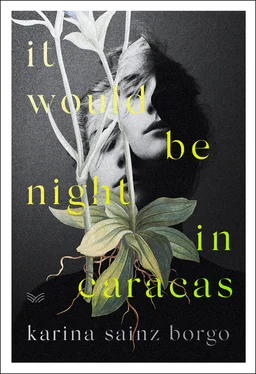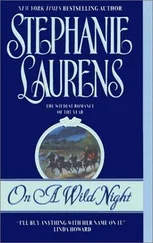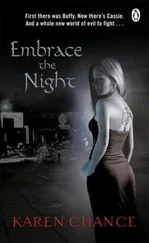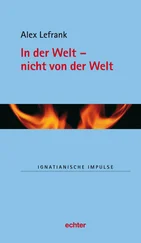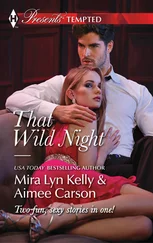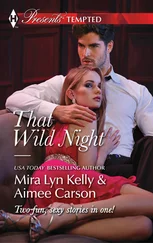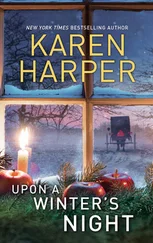The stone plum tree appeared in my dreams too. At times it sprouted from the city gutters; at others, from our apartment sink, or from the Falcón guesthouse laundry. I never wanted to wake from those dreams. Far more beautiful than their real-life counterparts, my dream trees were always full of pearly plums that transformed into glittery cocoons, sleeping caterpillars, which I thought were beautiful in a strange and slightly repugnant way. They moved imperceptibly, like the muscles on the horses that sometimes made their way down the road, beasts whose hooves must have been sore from hauling the sugarcane and cacao to the Ocumare market for the men to unload. That was how everything in the town happened: as if the nineteenth century had never given way to progress. If it weren’t for the public lighting and the Polar beer trucks that climbed the road, nobody would have believed that this was the eighties.
So as not to forget those impossible trees that sprouted in my dreams, I drew them in my Caribe sketch pad with wax crayons, choosing the pink and violet colors I found in my box of twenty-four. I used the sharpener to make resin shavings and rubbed those shavings against the paper with my fingertips, giving my grubs a halo effect. I could spend hours on each drawing. I created them with almost as much devotion as when I nibbled and sucked at the sour and veiny plums that to this day are fixed in my memory.
That tree at the Falcón guesthouse was my territory. I felt free on its lonely branch, after climbing it like a monkey. That part of my childhood had nothing in common with the fearful city where I grew up and that, as the years went on, became a jumble of fences and locks. I liked Caracas, but I preferred the sugarcane-and-mosquito days of Ocumare to the city’s dirty pavement, which was always strewn with rotten oranges and stained with engine oil. In Ocumare, everything was different.
The sea redeemed and remedied, swallowed bodies and spat them out. It intermingled with everything that crossed its path, like the Ocumare River, which to this day flows into the ocean, pushing at the salt with its fresh water. On the shore grew the sea grape trees with their scant berries that my mother would use to make beauty-queen tiaras for me, while I daydreamed, hidden, my earrings made of pearly caterpillars, of the metamorphosis the plums underwent when they crossed the membrane of reality.
I HEARD GUNSHOTS. Like I had the day before, and the one before that, and the one before that. A gush of dirty water and lead that separated my mother’s burial from the days that followed. At my desk by the window in my bedroom, I noticed that the apartments in the neighboring buildings were dark. It wasn’t unusual for the electricity to go out across the city, but there was electricity at my place yet not elsewhere, and that was strange. Something’s happening , I thought. I switched off the lamp. Sharp blows started up at Ramona and Carmelo’s place, one floor above. Furniture colliding. Chairs and tables being dragged from one spot to another. I picked up the phone and dialed. Nobody answered. Outside, the night and the confusion worked their own curfew. Venezuela was living through dark days, probably the worst since the Federal War.
A robbery , I thought, but how could that be when nobody had raised their voice? I peered out of the living-room window. A Dumpster was ablaze in the middle of the avenue. The wind was carrying off the cash that neighbors had resorted to burning, huddled in groups. Lean, sooty people who came together to illuminate the city with their poverty. I was about to phone Ramona again when down below I saw men in military intelligence uniforms exiting my building. There were five of them, and long guns were slung across their shoulders. One had a microwave in his hands, and another had a desktop computer case. Others were dragging a couple of suitcases. I didn’t know if I was witnessing a raid, a robbery, or both things at once. The men got into a black van and drove off in the direction of Esquina La Pelota. When they had disappeared into the intersection that led to the highway, a light came on in the neighboring building. Another followed. And another. Then one more. The colossal wall of blindness and silence began to awaken, while a whirlwind of flaming cash spiraled in gusts, propelled by the military truck as it sped off.
Before cash disappeared altogether, the revolutionary cabinet announced, on the commander-president’s orders, that paper money would be progressively eliminated. The decree’s purpose was to fight the financing of terrorism, or what the leaders deemed as such, but printing more money to replace the old was impossible. The money that circulated forcibly wasn’t worth anything, even before it was burned. A napkin was more valuable than a hundred-bolívar bill, which now went up in flames on the pavement like some kind of premonition.
At home there was enough food to last me two months, thanks to a stockpile that my mother and I had made a habit of adding to ever since the first lootings blighted the country years before. No longer out of the ordinary, lootings had become routine events. I was ready to resist thanks to the life lessons they’d given us, which I learned to administer instinctively. Nobody needed to show me how; instead, time was my teacher. War was our destiny, and it had been a long time before we knew it was coming. My mother was the first to intuit it. She made provisions and obtained supplies for years. If we could buy one can of tuna, then we would take two home. Just in case. We stocked the pantry as if fattening an animal that we would feed on forever.
The first looting I remember happened the day I turned ten. We were already living in the city’s west. We were isolated from the more violent part. Anything could happen. Filled with uncertainty, my mother and I watched as military platoons passed by on their way to Miraflores Palace, the seat of government, a few blocks from our building. A few hours later, on TV we saw swarms of men and women raiding stores. They looked like ants. Furious insects. Some were heaving legs of beef onto their shoulders. They ran with no thought for the splotches of still-fresh blood on their clothes. Others carried off televisions and appliances they’d pulled through windows smashed with stones. I even saw a man dragging a piano down Avenida Sucre.
That day, during a televised live broadcast, the minister of internal affairs called for calm and civility. Everything was under control, he assured us. A few seconds later, there was an awkward silence. An expression of terror crossed his face. He glanced to one side then the other and left the podium he’d been addressing the nation from. His plea for calm remained just that: a medium-long shot of an empty podium.
The country changed in less than a month. We started seeing trucks stacked with caskets, all of them tied down with ropes, and sometimes not even that. Soon, unidentified bodies were being wrapped in plastic bags and tossed into La Peste, the mass grave where the bodies of gunned-down men and women started fetching up by the hundreds. It was the first attempt by the Fathers of the Revolution to take power, and the first instances of “social unrest” that I remember. To celebrate my birthday, my mother heated a little sunflower oil and fried a maize bollo she’d shaped into a heart. It was a show of love in the shape of a kidney, golden at the edges and soft in the middle. My mother stuck a tiny pink candle in it. She sang “ Ay qué noche tan preciosa ,” a long and catchy national version of “Happy Birthday,” which unlike the original lasts a full ten minutes. Afterward she cut the heart into four and spread butter on each piece. We chewed in silence with the lights out, sitting on the living-room floor. Before we went to bed, a burst of gunfire added an ellipsis to that piñataless party that we celebrated in the dark.
Читать дальше
